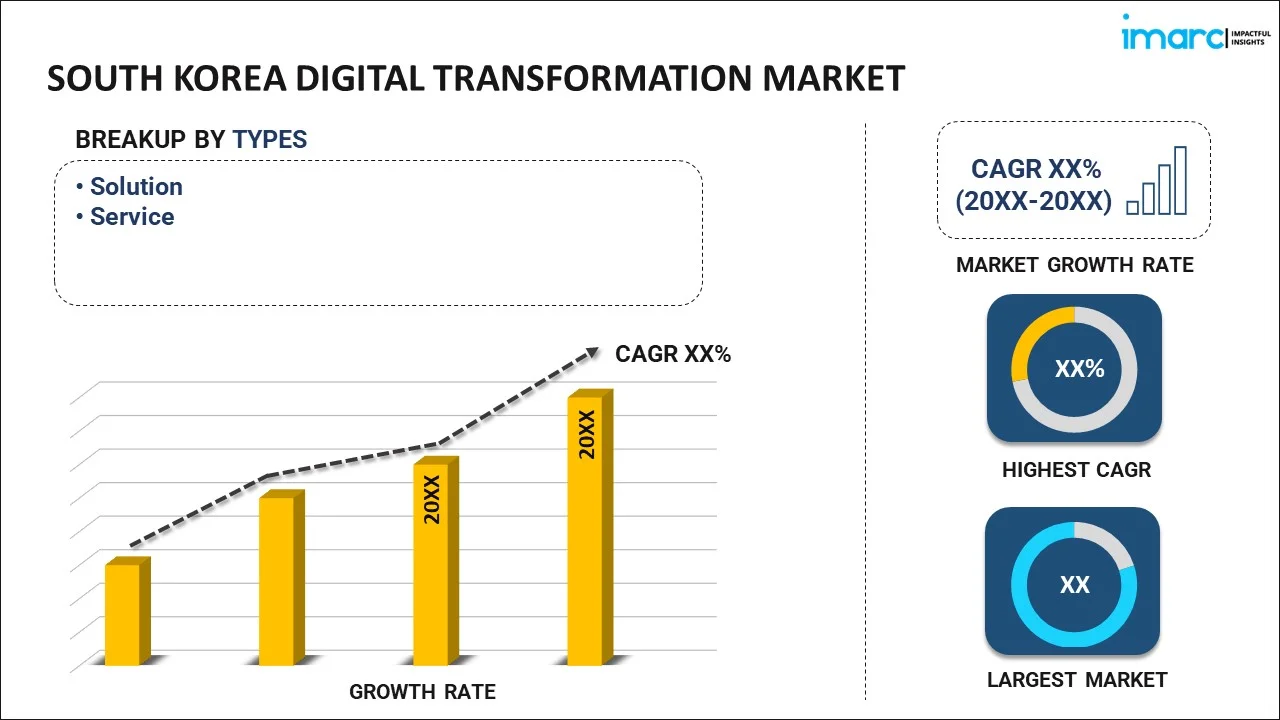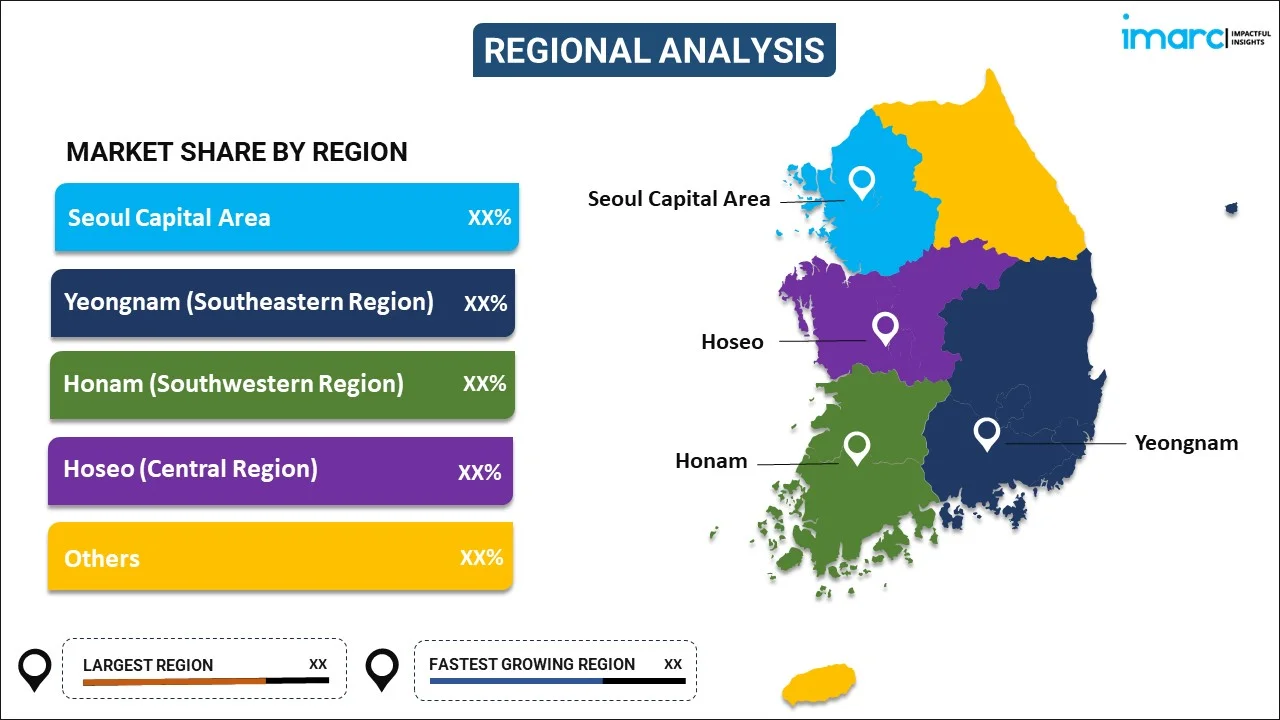
South Korea Digital Transformation Market Report by Type (Solution, Service), Deployment Mode (Cloud-based, On-premises), Enterprise Size (Large Enterprises, Small and Medium-sized Enterprises), End Use Industry (BFSI, Manufacturing and Retail, Government, Healthcare, IT and Telecom, and Others), and Region 2025-2033
Market Overview:
South Korea digital transformation market size reached USD 15,420.4 Million in 2024. Looking forward, IMARC Group expects the market to reach USD 70,169.6 Million by 2033, exhibiting a growth rate (CAGR) of 18.34% during 2025-2033. The rising number of online banking services, along with the growing penetration of wireless communications, is primarily driving the regional market.
|
Report Attribute
|
Key Statistics
|
|---|---|
|
Base Year
|
2024
|
|
Forecast Years
|
2025-2033
|
|
Historical Years
|
2019-2024
|
|
Market Size in 2024
|
USD 15,420.4 Million |
|
Market Forecast in 2033
|
USD 70,169.6 Million |
| Market Growth Rate 2025-2033 | 18.34% |
Digital transformation signifies a fundamental change in organizational culture, where the seamless incorporation of digital technologies revolutionizes diverse business processes, enhancing an organization's brand reputation, customer experience, and retention rates. Among the forefront technologies involved are 3D printing, robotics, artificial intelligence (AI), and additive manufacturing. This transformative approach optimizes business efficiency and core competencies by digitally streamlining operations. Consequently, digital transformation has become widespread across industries, encompassing banking, financial services and insurance (BFSI), healthcare, retail, transportation, and information technology (IT). These sectors harness digitalization's power to provide personalized services, securing their competitive advantage. Through the integration of digital technologies into various business functions, organizations can unlock heightened levels of efficiency and effectiveness. For example, 3D printing and additive manufacturing enable swift prototyping and on-demand production, reducing time-to-market and minimizing waste.
South Korea Digital Transformation Market Trends:
In South Korea, digital transformation emerges as a dynamic force driven by technological innovation, strategic government initiatives, and a digitally literate population. Additionally, the nation's commitment to becoming a technology hub propels industries toward comprehensive digital integration, which is primarily driving the market growth. Besides this, key factors include advancements in 5G technology, artificial intelligence (AI), and the Internet of Things (IoT), fostering an environment conducive to transformative changes, thereby positively influencing the regional market. Moreover, South Korea's thriving information and communication technology (ICT) infrastructure catalyze digital transformation trends across various sectors, including finance, healthcare, manufacturing, and smart cities. Apart from this, government-led initiatives, such as the Digital New Deal, reinforce South Korea's position at the forefront of digital innovation, which is bolstering the market growth across the country. Furthermore, companies are leveraging these trends to enhance customer experiences, optimize operations, and remain competitive in the market. As South Korea embraces the era of smart technology, digital transformation serves as a catalyst for economic growth, efficiency, and sustained innovation, which is expected to fuel the market growth in the coming years.
South Korea Digital Transformation Market Segmentation:
IMARC Group provides an analysis of the key trends in each segment of the market, along with forecasts at the country level for 2025-2033. Our report has categorized the market based on type, deployment mode, enterprise size, and end use industry.
Type Insights:

- Solution
- Analytics
- Cloud Computing
- Mobility
- Social Media
- Others
- Service
- Professional Services
- Integration and Implementation
The report has provided a detailed breakup and analysis of the market based on the type. This includes solution (analytics, cloud computing, mobility, social media, and others) and service (professional services and integration and implementation).
Deployment Mode Insights:
- Cloud-based
- On-premises
A detailed breakup and analysis of the market based on the deployment mode have also been provided in the report. This includes cloud-based and on-premises.
Enterprise Size Insights:
- Large Enterprises
- Small and Medium-sized Enterprises
The report has provided a detailed breakup and analysis of the market based on the enterprise size. This includes large enterprises and small and medium-sized enterprises.
End Use Industry Insights:
- BFSI
- Manufacturing and Retail
- Government
- Healthcare
- IT and Telecom
- Others
A detailed breakup and analysis of the market based on the end use industry have also been provided in the report. This includes BFSI, manufacturing and retail, government, healthcare, IT and telecom, and others.
Regional Insights:

- Seoul Capital Area
- Yeongnam (Southeastern Region)
- Honam (Southwestern Region)
- Hoseo (Central Region)
- Others
The report has also provided a comprehensive analysis of all the major regional markets, which include Seoul Capital Area, Yeongnam (Southeastern Region), Honam (Southwestern Region), Hoseo (Central Region) and Others.
Competitive Landscape:
The market research report has also provided a comprehensive analysis of the competitive landscape. Competitive analysis such as market structure, key player positioning, top winning strategies, competitive dashboard, and company evaluation quadrant has been covered in the report. Also, detailed profiles of all major companies have been provided.
South Korea Digital Transformation Market Report Coverage:
| Report Features | Details |
|---|---|
| Base Year of the Analysis | 2024 |
| Historical Period | 2019-2024 |
| Forecast Period | 2025-2033 |
| Units | Million USD |
| Scope of the Report | Exploration of Historical and Forecast Trends, Industry Catalysts and Challenges, Segment-Wise Historical and Predictive Market Assessment:
|
| Types Covered |
|
| Deployment Modes Covered | Cloud-based, On-premises |
| Enterprise Sizes Covered | Large Enterprises, Small and Medium-sized Enterprises |
| End Use Industries Covered | BFSI, Manufacturing and Retail, Government, Healthcare, IT and Telecom, Others |
| Regions Covered | Seoul Capital Area, Yeongnam (Southeastern Region), Honam (Southwestern Region), Hoseo (Central Region), Others |
| Customization Scope | 10% Free Customization |
| Post-Sale Analyst Support | 10-12 Weeks |
| Delivery Format | PDF and Excel through Email (We can also provide the editable version of the report in PPT/Word format on special request) |
Key Questions Answered in This Report:
- How has the South Korea digital transformation market performed so far and how will it perform in the coming years?
- What has been the impact of COVID-19 on the South Korea digital transformation market?
- What is the breakup of the South Korea digital transformation market on the basis of type?
- What is the breakup of the South Korea digital transformation market on the basis of deployment mode?
- What is the breakup of the South Korea digital transformation market on the basis of enterprise size?
- What is the breakup of the South Korea digital transformation market on the basis of end use industry?
- What are the various stages in the value chain of the South Korea digital transformation market?
- What are the key driving factors and challenges in the South Korea digital transformation?
- What is the structure of the South Korea digital transformation market and who are the key players?
- What is the degree of competition in the South Korea digital transformation market?
Key Benefits for Stakeholders:
- IMARC’s industry report offers a comprehensive quantitative analysis of various market segments, historical and current market trends, market forecasts, and dynamics of the South Korea digital transformation market from 2019-2033.
- The research report provides the latest information on the market drivers, challenges, and opportunities in the South Korea digital transformation market.
- Porter's five forces analysis assist stakeholders in assessing the impact of new entrants, competitive rivalry, supplier power, buyer power, and the threat of substitution. It helps stakeholders to analyze the level of competition within the South Korea digital transformation industry and its attractiveness.
- Competitive landscape allows stakeholders to understand their competitive environment and provides an insight into the current positions of key players in the market.
Need more help?
- Speak to our experienced analysts for insights on the current market scenarios.
- Include additional segments and countries to customize the report as per your requirement.
- Gain an unparalleled competitive advantage in your domain by understanding how to utilize the report and positively impacting your operations and revenue.
- For further assistance, please connect with our analysts.
 Request Customization
Request Customization
 Speak to an Analyst
Speak to an Analyst
 Request Brochure
Request Brochure
 Inquire Before Buying
Inquire Before Buying




.webp)




.webp)












